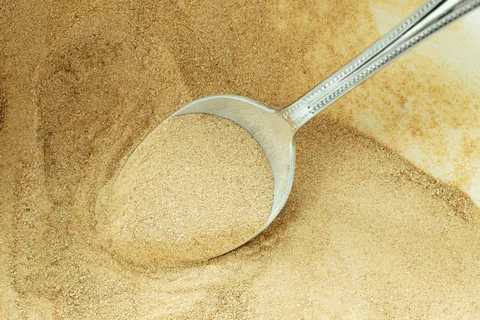
Nutritional yeast is a popular food product known for its savory flavor and nutritional benefits. It’s commonly used as a cheese substitute in vegan dishes and is rich in protein, vitamins, and minerals. While nutritional yeast is generally considered safe for most people, like any food, it may cause side effects in some individuals. In this guide, we’ll explore four potential side effects of nutritional yeast, along with factors to consider and FAQs to help you make informed decisions about its consumption.
Risk of Allergic Reactions
Yeast Sensitivity
Allergic Reactions
Some individuals may be allergic to yeast or yeast-derived products, including nutritional yeast.
Symptoms
Allergic reactions may manifest as skin rashes, itching, swelling, gastrointestinal discomfort, or respiratory issues.
Precautions
Patch Testing
If you’re unsure whether you’re allergic to nutritional yeast, perform a patch test by applying a small amount to your skin and monitoring for any adverse reactions.
Consultation
If you have a known yeast allergy or sensitivity, consult with a healthcare professional before consuming nutritional yeast to assess the potential risks.
Risk of Gastrointestinal Distress
Digestive Issues
Gas and Bloating
Nutritional yeast contains fiber and fermentable carbohydrates, which may cause gas and bloating in some individuals, particularly those with sensitive digestive systems.
Diarrhea
Excessive consumption of nutritional yeast may lead to diarrhea or loose stools due to its high fiber content.
Precautions
Moderation
Start with small amounts of nutritional yeast and gradually increase your intake to assess your tolerance.
Hydration
Drink plenty of water when consuming nutritional yeast to help prevent or alleviate gastrointestinal discomfort.
Potential for Excess Sodium Intake
Sodium Content
High Sodium Levels
Some brands of nutritional yeast may contain added salt to enhance flavor, leading to increased sodium intake.
Risk for Hypertension
Excessive sodium intake can contribute to high blood pressure and cardiovascular issues, particularly in individuals with hypertension or salt-sensitive conditions.
Precautions
Read Labels
Choose low-sodium or sodium-free varieties of nutritional yeast whenever possible, and check labels for sodium content.
Limit Intake
Be mindful of your overall sodium intake from other sources and consume nutritional yeast in moderation to avoid excessive sodium consumption.
Risk of Heavy Metal Contamination
Quality Concerns
Heavy Metal Accumulation
Nutritional yeast may contain trace amounts of heavy metals such as lead, cadmium, or arsenic, which can accumulate during the fermentation process or from environmental contamination.
Health Risks
Chronic exposure to heavy metals can have detrimental effects on health, including neurological issues, kidney damage, and cancer risk.
Precautions
Choose Reputable Brands
Opt for nutritional yeast products from reputable brands known for quality and safety standards.
Third-Party Testing
Look for products that undergo third-party testing for heavy metal contamination and adhere to strict quality control measures.
FAQs on Nutritional Yeast
Is nutritional yeast safe for pregnant or breastfeeding individuals?
While nutritional yeast is generally considered safe, pregnant or breastfeeding individuals should consult with a healthcare professional before consuming it, especially if they have known allergies or dietary restrictions.
Can nutritional yeast interact with medications?
There are no known interactions between nutritional yeast and medications. However, if you have concerns about potential interactions, consult with a healthcare professional for personalized advice.
Can nutritional yeast be consumed by individuals with Candida overgrowth or yeast infections?
Some healthcare professionals recommend avoiding nutritional yeast in cases of Candida overgrowth or yeast infections due to its yeast content. Consult with a healthcare provider for personalized recommendations.
Is nutritional yeast suitable for individuals with gluten intolerance or celiac disease?
Nutritional yeast is naturally gluten-free and can be safely consumed by individuals with gluten intolerance or celiac disease, but it’s essential to check labels for potential cross-contamination.
Can nutritional yeast be included in a low-carb or ketogenic diet?
Nutritional yeast is relatively low in carbohydrates and can be included in moderation as part of a low-carb or ketogenic diet. However, be mindful of portion sizes to avoid exceeding carbohydrate limits.
Are there any nutritional benefits of fortified nutritional yeast?
Fortified nutritional yeast may provide additional vitamins and minerals, such as vitamin B12, which is essential for vegans and vegetarians. Check labels for fortification information and choose fortified varieties for added nutritional benefits.
How should nutritional yeast be stored to maintain freshness?
Store nutritional yeast in a cool, dry place away from moisture and sunlight to maintain its freshness and flavor. Sealed containers or resealable bags are ideal for storage.
In summary
while nutritional yeast offers numerous nutritional benefits and culinary uses, it may cause side effects in some individuals, particularly those with allergies, sensitivities, or specific dietary concerns. By being mindful of potential risks, moderating intake, and consulting with healthcare professionals when necessary, you can enjoy the savory flavor and health benefits of nutritional yeast while minimizing the likelihood of adverse effects.

